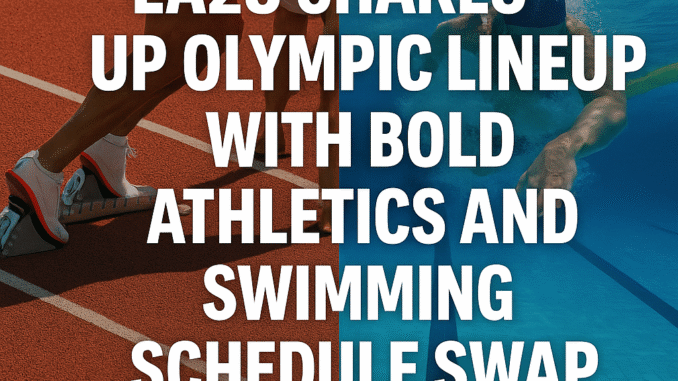
LA28 Shakes Up Olympic Lineup with Bold Athletics and Swimming Schedule Swap…Read More…
In a groundbreaking move that’s sending ripples through the global sports community, the organizers of the Los Angeles 2028 Olympic Games have officially unveiled a bold twist to the traditional Olympic schedule — athletics and swimming, two of the Games’ marquee sports, will switch their traditional slots in the competition lineup.
The announcement, made during a high-profile press conference at the LA28 Organizing Committee headquarters, has stirred excitement, curiosity, and debate among athletes, coaches, and fans alike. For the first time in modern Olympic history, the athletics program — historically the centerpiece of the final days of the Games — will take place during the opening week, while swimming, traditionally one of the headline acts of the opening week, will now close the Games.
A Strategic Vision for a New Olympic Era
Casey Wasserman, chair of the LA28 Organizing Committee, explained the decision as part of the city’s vision to reimagine the Olympic experience for both live audiences and global viewers.
“We want to celebrate the diversity of sports and give every discipline its unique moment to shine,” Wasserman stated. “Swimming has long electrified audiences in the opening days, but we believe its grand finales, the relays, and iconic showdowns deserve a global stage at the climax of the Games. Similarly, athletics — with its mix of sprints, endurance races, and field events — will ignite the Olympic spirit right from the start.”
Wasserman emphasized that the decision wasn’t made lightly and involved detailed consultations with the International Olympic Committee (IOC), global sports federations, and athlete representatives.
The Ripple Effect on Athletes and Federations
Athletes from both disciplines have begun to weigh in on the historic change.
Noah Lyles, the reigning world champion in the 200 meters, expressed enthusiasm over social media, saying, “I love it! Opening week of the Olympics and the world’s watching track? Let’s make it legendary.”
On the swimming front, American freestyle star Katie Ledecky admitted the change would require a shift in preparation but saw it as a positive challenge. “Closing out the Games with swimming finals will be something special. It’s a new opportunity for our sport to capture hearts when the world is tuned in for the grand finale,” she said in a statement.
However, not everyone greeted the news with immediate celebration. Several federations voiced concerns over logistics, athlete recovery schedules, and media coverage. World Athletics President Sebastian Coe acknowledged the adjustment would demand flexibility but praised the spirit of innovation.
“This is a bold move by LA28. We trust it will open new doors for showcasing athletics to fresh audiences,” Coe remarked.
FINA, the global governing body for swimming, echoed a similar sentiment, noting they would work closely with LA28 organizers to ensure optimal competition conditions for swimmers who may be unaccustomed to closing-week competition formats.
Broadcast and Fan Experience Redefined
One of the most significant implications of the schedule shake-up is the impact on broadcasting rights and viewer engagement. NBC, the host broadcaster for the Olympics in the United States, welcomed the decision as a means to sustain high ratings throughout the entirety of the Games.
Rick Cordella, President of NBC Sports, commented, “This change allows us to build narrative arcs across both sports, giving fans even more reasons to stay connected from the opening ceremony to the final medal events.”
Spectators and fans in Los Angeles are also expected to benefit. The early scheduling of athletics allows marquee events like the 100-meter finals to be held during prime-time slots over the first weekend — a decision likely to drive massive ticket sales and attendance.
Similarly, having swimming events crescendo during the final days creates the potential for emotional, medal-clinching moments to serve as the Games’ grand send-off.
A Sign of Things to Come?
Sports analysts are already speculating whether this move could set a precedent for future Olympic Games. Some see it as a one-off experiment fitting LA’s reputation for boldness and innovation. Others believe it could pave the way for a more flexible, dynamic approach to Olympic scheduling in the future.
International Olympic Committee President Thomas Bach lauded the LA28 organizers for their creativity, saying, “The Olympic Games are a living movement. Adjustments like these keep the spirit alive and ensure the Games remain compelling for new generations.”
Countdown to a Historic Games
With three years remaining until the Olympic flame is lit in Los Angeles, the world will watch closely as athletes, federations, and organizers adapt to this unprecedented schedule swap.
As the dust settles from this announcement, one thing is clear — LA28 isn’t afraid to challenge tradition in pursuit of a fresher, more engaging Olympic experience. Whether this bold shift will redefine the future of the Games remains to be seen, but the excitement it has already generated is undeniable.
The world will find out in the summer of 2028 when the athletics stars launch the Games into full sprint — and the swimmers anchor the final leg of an Olympic fortnight like never before.
Leave a Reply